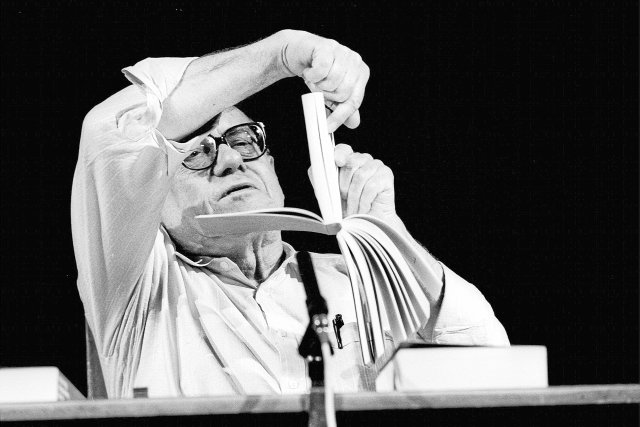And one day the forest becomes paper.
Photo: images/set
“Schtzngrm / Schtzngrmm / Tttt / Tttt”, the first verses of a poem from 1957. In addition to “Ottos Mops”, it is one of the more well -known works of the Austrian writer and poet Ernst Jandl. In the Poem, the war was once not warned, accusing, warning, warning (or glorifying) of the poem, as was previously used to the literature, but acoustically reproduced, in a partly broken, but also newly invented language, which has freed itself from everything. The poem, which seems to be made of written battle noise and in which words are alienated to war noise, refers to what the war is at the end: a material battle, a place of mechanical killing and being killed.
The anti -militarist Jandl, who belonged to a disappearingly small minority in the post national socialist Austria, had learned to distrust those words and sentences that once brought the war. He put the subversive language game, the linguistic reduction and disassembly of the language into its individual parts to the language of the Nazi propaganda, kitsch and the symbol of the instruction and the language of instruction and construction, i.e. in the tradition of the dadaists who practiced their type of language canters 40 to 50 years earlier. In fact, Jandl saw himself in the tradition of clever experiments such as Velimir Chlebnikow, Expressionists like August Stramm and Dadaists like Kurt Schwitters, who he saw as a tradition of deviation.
Which of course triggered irritation and outrage with the conservative literary operating guards of the German-Austrian post-war period. The poet Jandl, who had found a very idiosyncratic language and form for himself, was a “poet without his own language,” said Suhrkamp publisher Siegfried Unseld in the 1960s, whose publisher was not exactly poor in misjudgments.
In addition to the poems, Jandl also wrote essayist work, prose, plays and radio plays. When asked that he once wrote that he wanted to “remove the cute from the poetry”, he replied in an interview from 1986: “Our life follows largely existing norms. And therefore the non -nourished, that the norm contradicts or the non -normal or what has moved away from the norm is the exciting thing, that’s what is interesting, so what can make a quake. «
The fact that the man was not only representative of the experimental poetry of the post -war period, but also a great humorist may show this poem from 1954: “Summer song // We are people on the meadows / Soon we are people among meadows / and will be meadows, and will be a cheerful country stay”. If you find it strange and would like to laugh on, the best radio play in the world is recommended at this point. It was created in 1976 and is called »the humanists. Conversation in one act «. The radio play author and producer Hermann Bohlen judges as follows: »It is gripping, radical, relentless and short. You also understand it the first time. It inspires, encouraged, raised and enthusiastically raised. But it comes with very simple means, three human voices and a mg. «Please listen to it. Do it in honor of Ernst Jandl, who was born 100 years ago today.
